By refusing to resign, Kevin de León gives anti-Blackness a pass
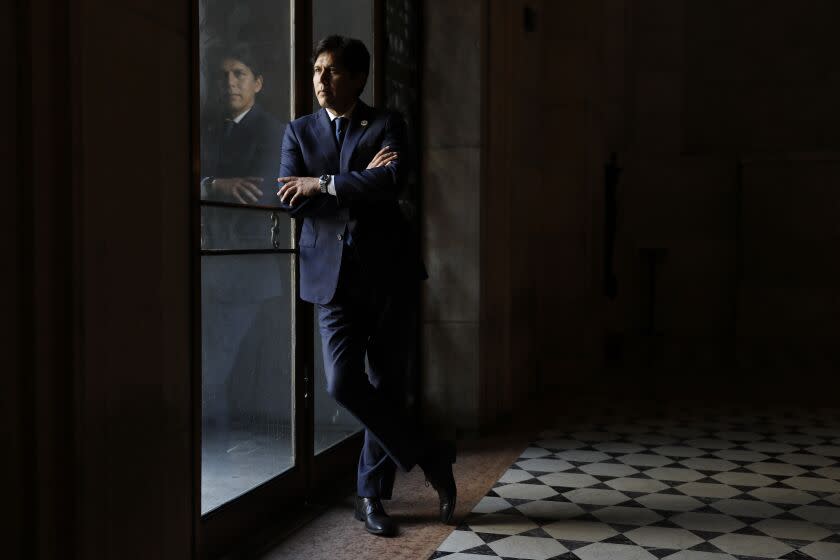
- Oops!Something went wrong.Please try again later.
- Oops!Something went wrong.Please try again later.
- Oops!Something went wrong.Please try again later.
- Oops!Something went wrong.Please try again later.
I can’t get a particular song out of my head, and I apologize now for putting it in yours. Let’s all blame Kevin de León.
“We’re off to see the Wizard, the wonderful Wizard of Oz!”
During the last month and change since we all heard that leaked discussion between three of our City Council members and a labor leader, I’ve wondered whether the song has become a defense mechanism of sorts for me.
Does that cheery anthem start ringing in my ears anytime I think about the juvenile analogy that De León, District 14’s still-councilman, used during that conversation? Am I conjuring Judy Garland and company, skipping down the yellow brick road to meet the Wizard, the man behind the curtain — all to avoid thinking about all the racism and cynical politics inherent in both their language and in the maneuvering they sought to execute?
Or is a sign of how absurd it is to hear a public servant insulting every single Black Angeleno and using a fairy tale to do it?
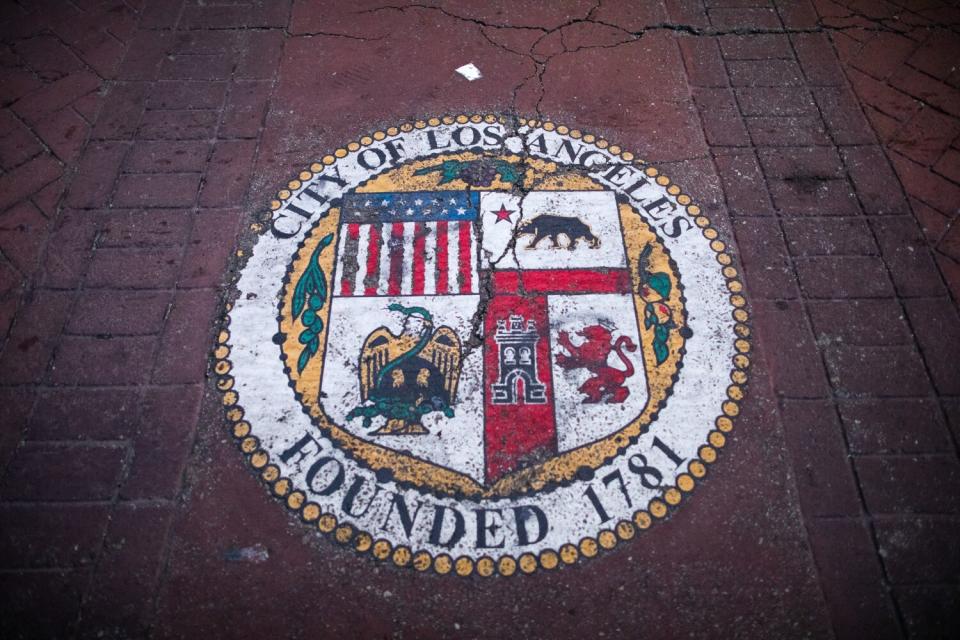
“What I mean by 'The Wizard of Oz' effect is when you're at the side of the curtain, it's like this big voice,” De León explained to the other three in the room, more than a year ago now. “It sounds like there's thousands. And then when you actually pull the curtain ... you see the little Wizard of Oz.” After then-City Council President Nury Martinez said she’d never seen the movie, fellow Councilman Gil Cedillo and then-Los Angeles County Federation of Labor President Ron Herrera piled on. Cedillo conjured the scenario of “25 Blacks” shouting. De León then took the baton, adding, “They shout like they're 250. When there's 100 of us,” meaning Angelenos of Mexican descent, "it sounds like there's 10 of us.”
I cast a vote for De León in 2018, when he ran for the U.S. Senate. I’m only now returning to California after nearly two years away, so he was the person in that room whose politics and record I knew the best, and who disappointed me most. I was hardly alone.
“For me, personally, it's hurtful. De León was a student in my class as an undergrad,” said Melina Abdullah, Black Lives Matter-Los Angeles co-founder and former Pan-African Studies chair at Cal State L.A. “He has always presented himself as someone who was not just a friend of Black community, but a friend of Black organizing. He cut his teeth in labor organizing and had been who many of us thought was a friend. I think that's the story of this, overall.”
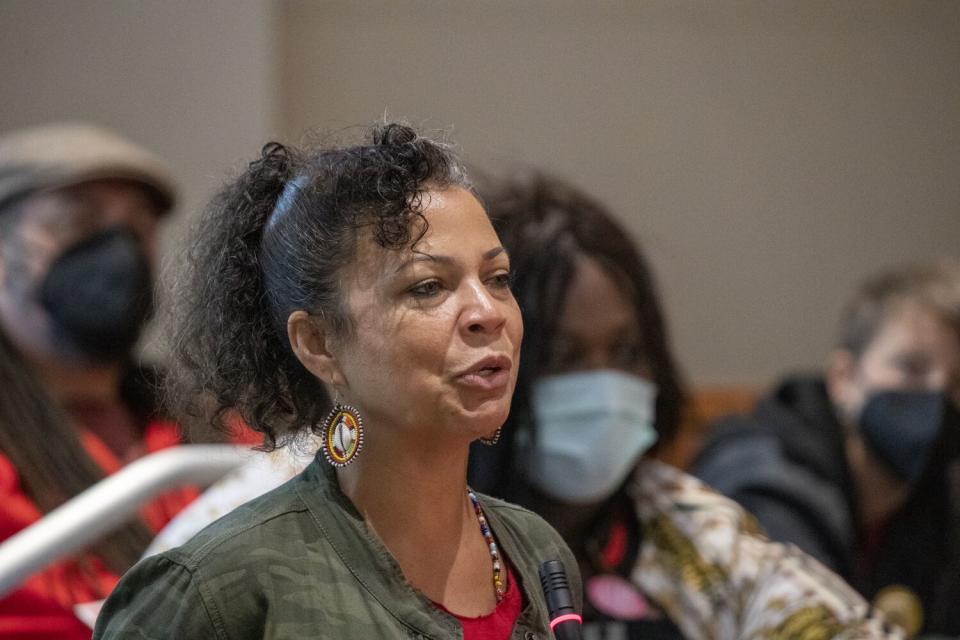
I couldn't reach De León himself for comment, but I got Pete Brown, his director of communications, on the phone late last week. Since the tape's leak, Brown said the councilman has been "very explicit when he said he failed in his responsibility and duty to speak up." He also understood that he'd offended many Angelenos, particularly Black folks with his "poorly worded way of discussing the inequality and the underrepresentation of Latinos on the City Council."
When I asked Brown why De León remains convinced that this scandal is politically survivable, he used De León's time on the City Council as a defense for his refusal to leave it. In a little more than two years, Brown said, "he has a strong record, a demonstrated record of representing the interests of all groups of people, regardless of color, regardless of religious affiliation.
"This entire incident deeply hurts him," Brown added, "because it seemingly gives the impression that that's not the case — when his record demonstrates that he's always been at the forefront of fighting for people."
No one should expect a politician to be perfect. It isn't unreasonable, though, to expect one not to use a "Wizard of Oz" analogy to diminish Black political voices in Los Angeles. And that's what he did.
The three council members in that room were not the first elected officials to be antiracist in public, then talk like this when no one is watching.
Be happy about the midterm elections if you like. I certainly don’t begrudge anyone celebrating the election of Karen Bass, who has become the first woman elected mayor of Los Angeles in its 241 years of existence — and only the city's second Black one.
Yet we've been reminded during this election season that anti-Blackness is still thriving. More than 53 million Americans, the majority of those casting ballots in this election, voted for a party that embraces racism in rhetoric and policy alike. And many of those Republican voters will likely choose that seditionist, twice-impeached ex-president whose political ascendance began with perpetrating the bigoted “birther” lie.
De León and his three comrades aren’t Donald Trump, but on that fateful day in the back room, they were swimming in the same waters.
After the leak became public on Oct. 9, Martinez took her time but eventually stepped down. De León is still in the pool, so to speak. He insists he didn’t commit a fireable offense.
"I want to be very clear that staying in his seat gives his constituents a voice on the City Council," Brown said during our call. "It allows him to make critical decisions on their behalf that look out for their interests and their needs."
De León has reiterated that in interviews, saying that he wants to provide District 14 with its voice on City Council, though he stopped showing up to council meetings after the tape emerged. Even before I talked with his spokesman, the councilman had been communicating his argument with his actions: that politics are the best method to help the city recover.
So, De León refuses to resign. And while tending to his own wounds, he keeps ours from closing.
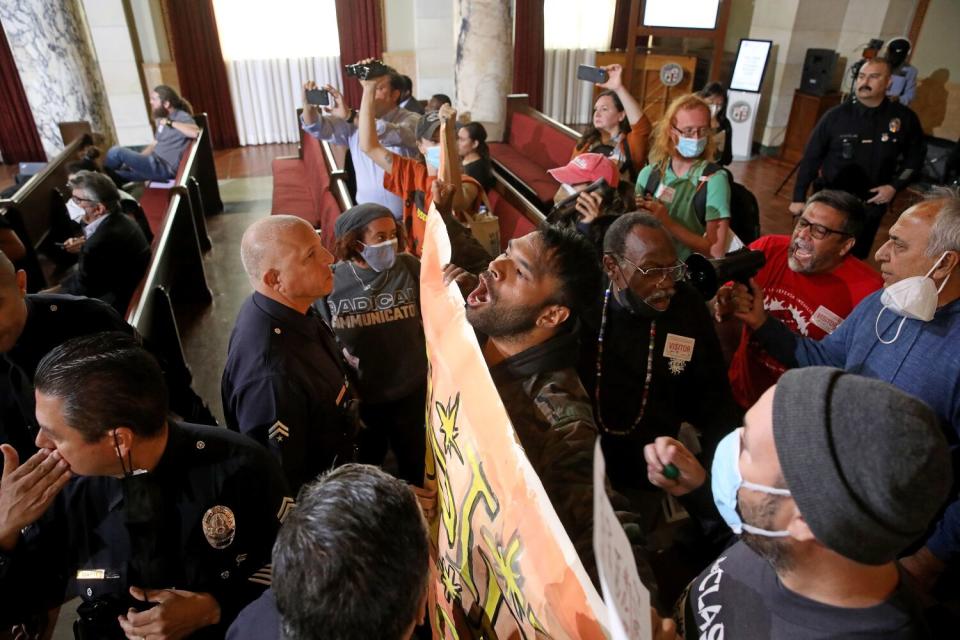
We have to go beyond the slurs. “Changuito,” “su negrito,” and “F— that guy ... he’s with the Blacks” garnered the most attention because we’ve been taught in this country and culture to primarily recognize racism in the form of vitriolic language. De León’s Oz analogy was considerably more insidious, and potentially more perilous.
We Black folks are used to being overestimated in the worst ways, and for the worst reasons. There is a long history of doctors misjudging our tolerance for pain. Our children are viewed and judged as adults, and therefore less innocent or even threats. Both Black and Latino Americans are given unwanted credit for our resilience as we wait in longer-than-average lines to vote, or persist on increasingly unequal pay. Our voices have been called too intense or aggressive, to use some diplomatic euphemisms. The trick, of course, is to envision us as something mightier than we are in order to validate what is then done to us. It does damage all its own, even when a councilman is just saying that we’re supernaturally loud.
Sadly, there is the faint possibility of the speaker considering it a compliment. Those folks, “the Blacks,” have voices so strong that they overpower others who are more numerous! (Are we also articulate and well-spoken when we shout, I wonder?)
This kind of nonsense is directed at Latino and Black folks alike. It was as if people who had spent their lives seeing racist words and policy directed at Latinos in Los Angeles had begun wielding the proverbial master’s tools. The leaked tape could have dropped with the title "When Working Within the System to Change the System Goes Wrong."
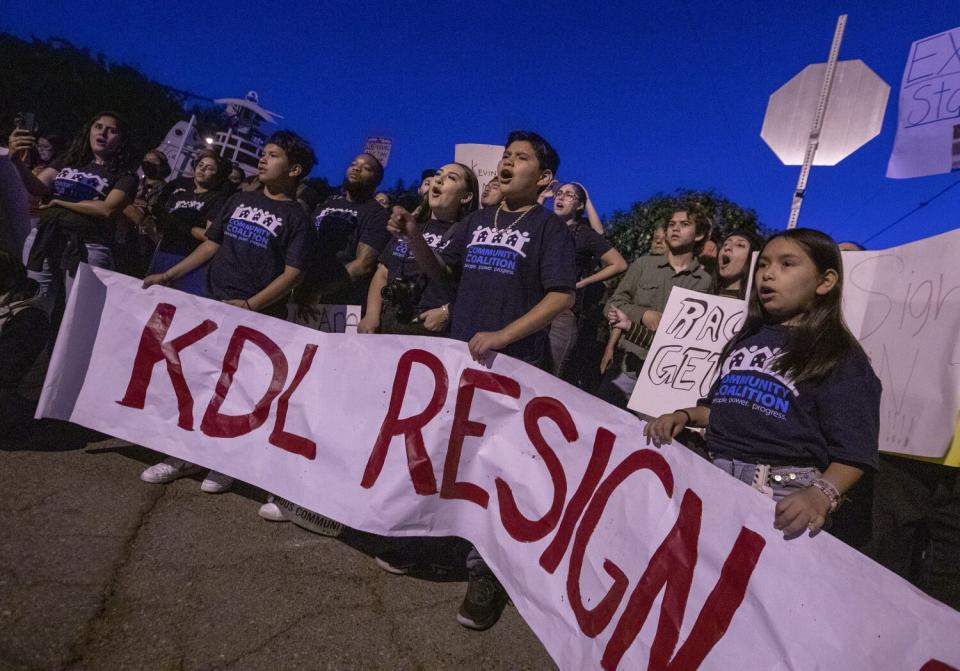
Getting into and remaining in the higher echelons of political power too often requires deep compromises from people who aren’t white. When we spoke, UCLA political psychologist Efrén Pérez likened the compromises made to the way fraternity or sorority pledges are encouraged to act. They’re presented both with mandated concessions and tempting incentives to keep what, in the end, is a very marginal position. Yet still, the allure of politics remains.
Few things are quite as American as the pursuit of power, and we heard four people on that tape who got lost on the path. If De León or anyone else in this city were to say that Latino political representation is disproportionately small, they surely have an argument backed up by history. We should never lose sight of Latino and Indigenous underrepresentation in a city founded by Latinos on land already occupied by the Ventureño Chumash, Gabrieleño Tongva and Fernandeño Tataviam peoples, among others. The reasons for the political disenfranchisement of Latino, Indigenous, Black and other folks who aren't white throughout L.A.'s history city are myriad, certainly: language barriers, poor public education, immigration statuses and other assorted impediments erected between them and a largely monochromatic ruling class.
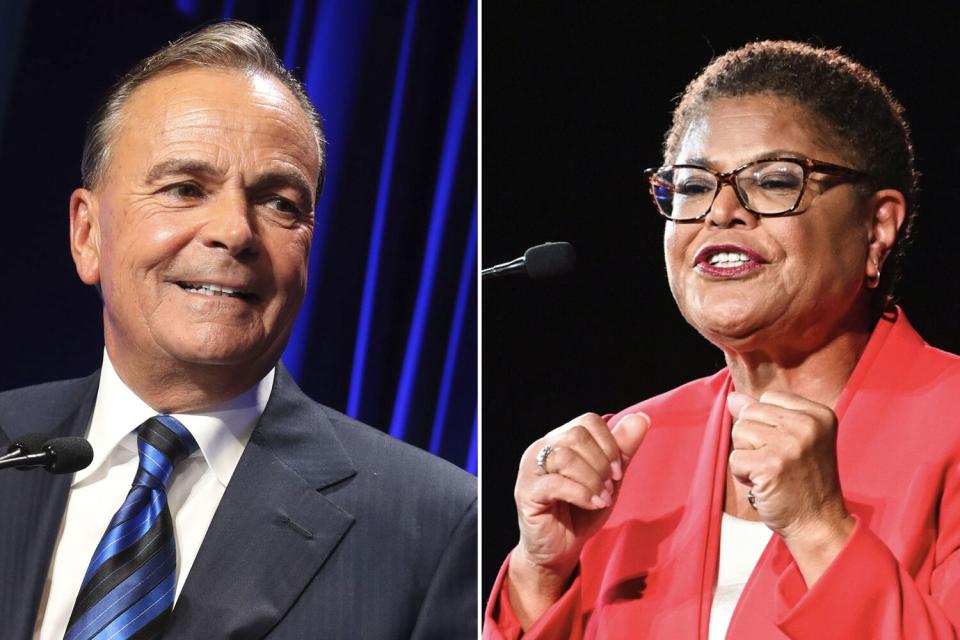
The four on that tape weren’t reckoning with that legacy of underrepresentation and inequity, though. Whether intentionally or not, they were perpetuating it. This whole mess reminds us of the limited significance of having people in power who look like you, if they keep using their considerable authority to maintain a system that has so often counted people who look like me and De León as second-class citizens. Representation is not simply a matter of feelings. We can't afford to settle for elected officials being aspirational symbols or avatars of social progress. Politics, ultimately, has to be about producing results.
Pérez’s UCLA colleague, historian Kelly Lytle Hernandez, made me think about how the leaked tape called into question the significance, or limits, of racial representation in politics. Throughout the recording, we hear the four of them talk about how they can toy with the city's redistricting process in ways to help them retain their own power. Not once do any of them talk about how they might adopt policies that convince Angelenos to support them.
“Why are we having people of color [in these roles] if they're not going to see our struggle?" Lytle Hernandez asked. "Our struggles have commonalities. Instead, they're trying to position themselves for power, their allies for power. That was the most disheartening part of it for me.”
Have we been having the wrong conversation about that conversation? Whether you take the meaning of “representation” to be about ethnicity or politics — or both — what is painfully clear from listening to that tape is those people aren’t representing anyone but themselves.
If it wasn’t evident when Martinez awkwardly shouted out “all the little Latina girls” on her way out of the door, the four of them were just exploiting identity. Worst of all, the cultural repercussions fall upon folks who may have felt, prior to that recording, some pride in knowing that Martinez, De León and Cedillo were representing them in ways that went beyond politics. It’s easy to hide from the very real divides between Black and Latino Angelenos when, like De León these days, one appears to be merely staying afloat and waiting out a scandal.

Racism isn’t the only culprit in this scandal. We can also blame careerist politics.
De León won’t stop apologizing. But he also won’t leave. He won’t permit the residents of his district to elect another representative to serve the remaining two years of his term. He ignores the demands of countless people, including President Biden, fellow council members and the Angelenos who make their voices heard loudly as they peacefully disrupt the City Council’s efforts to meet. This is common political behavior, surely. We’re witnessing career triage. Being sorry has become his job.
Cedillo isn’t being as vocal about his refusal to leave the City Council, perhaps since he lost his bid for reelection in District 1 this past June. His term runs out before the new year. However, De León conceivably could be in office until December 2024, still earning a $229,000 salary were he to stand firm. That isn’t including other benefits, including a pension, that may elevate that compensation.
“What we should understand from this is that, I would say, probably the majority of elected officials are in office because of their own political ambitions,” said Abdullah. “We need to do a better job, really interrogating those who want to represent us around what their vision is, for whatever office they seek to hold.”
Why won’t De León make like a tree and get out of here? If I’m hearing him correctly, it’s because he wants to keep plying his trade. He wants to be a public servant, in both a literal and professional sense.
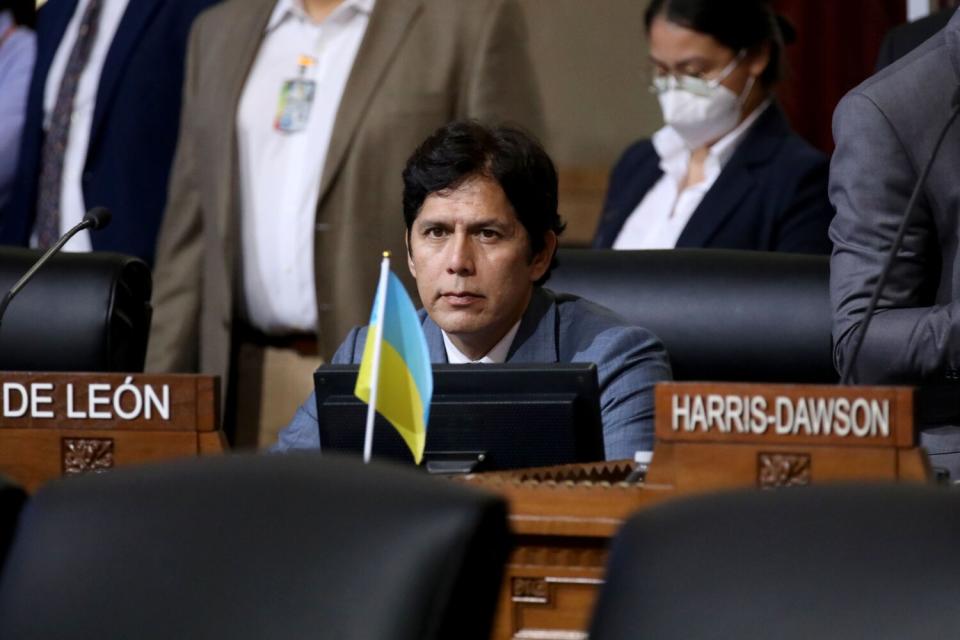
“No, I will not resign, because there is a lot of work ahead,” he told Noticiero Univision, listing a number of civic dilemmas during an interview that he’d still like to address as a councilman. Eventually, I guess, when he gets back to the job of being one.
“I have to do the hard work. I have to repair. I have to help heal. I have to help restore,” De León said during an interview on KCAL-TV Channel 9, offering zero evidence why he needs to do that “hard work” and “repair” while remaining an elected official.
“I,” “me,” and “my” are doing a lot of work in these De León remarks, which may seem right to some. I’m all for repentance, but saying “I’m sorry” is only the start of that. Apologies are not accountability.
De León must know this. He's been in elective office consistently since 2006. A former member of California's state Assembly and the former president pro tempore of the Senate, the councilman has applied for several jobs in politics — most recently the position of mayor here in L.A. So why does he need to keep this one? Perhaps because he is unlikely to be elected to anything in the state of California again?
This is the invisible contract that De León and others have signed, as politicians. They talked about constituent concerns on that call, but the system demands an inordinate focus upon perpetual employment and possible advancement. That boiled to the surface in the ugliest of ways.
Given how nasty and often unproductive politics can be, why not try another approach? Abdullah noted De León's history as an organizer, and he may soon have to return to that. De León is more experienced than most at pushing for change inside and outside of politics. So if he truly wants to help Los Angeles recover from this, he needs to persuade us why he needs to have a job on the City Council to accomplish that. If the city requires healing or work to repair, why would any of us want De León to be involved at all — given that he’s one of the perpetrators of the injury?
De León is reminding us why “career politician” should be an oxymoron. The council members on the call may have been intent on protecting the interests of their constituents, but their personal interests appeared to take precedence.
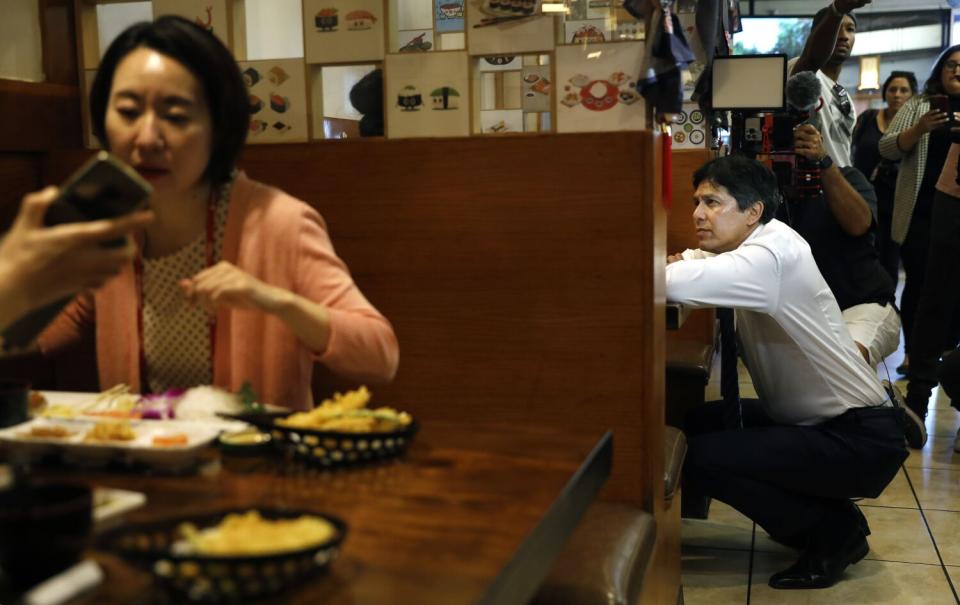
Trying to survive in politics also inevitably makes things all about the politician, and that just makes things worse. During an hour De León spent on live radio with KBLA-AM host Tavis Smiley late last month, he repeatedly cited “my heart” and “my values” and “my principles” as evidence that he is definitely Not a Racist and committed to allyship with Black Angelenos.
Those words mean the councilman isn’t following what I’ve long called the "Jay Smooth Rule." It originated from a video blog, “How to Tell Someone They Sound Racist,” that the longtime DJ and cultural commentator put out 14 years ago. Concise and hilarious, it remains the perfect guide to having a conversation like the one L.A. is attempting to have with De León and his fellow back-room conspirators.
When confronting someone accused of doing or saying something racist, focus on What They Did and not What or Who They Are. It is to the perpetrator’s advantage when it becomes a What They Are conversation, because soon we’re talking about “my heart,” “my values,” “my principles.” We have to hear about all the times in their lives when they’ve been nice to Black people, and whether their body contains any racist bones. Soon, as Jay notes in the video, we’re not talking about what they did at all — and it then becomes that much easier to forget.
Politicians love the Who They Are gambit because it usually, eventually, allows them to keep their jobs. Collectively, people tend to be both forgiving and forgetful to a fault. Our ad nauseum exposure to De León’s penitence junket has only underscored this question: Why does someone need to remain in that job to do the “work” he claims he wants to do?
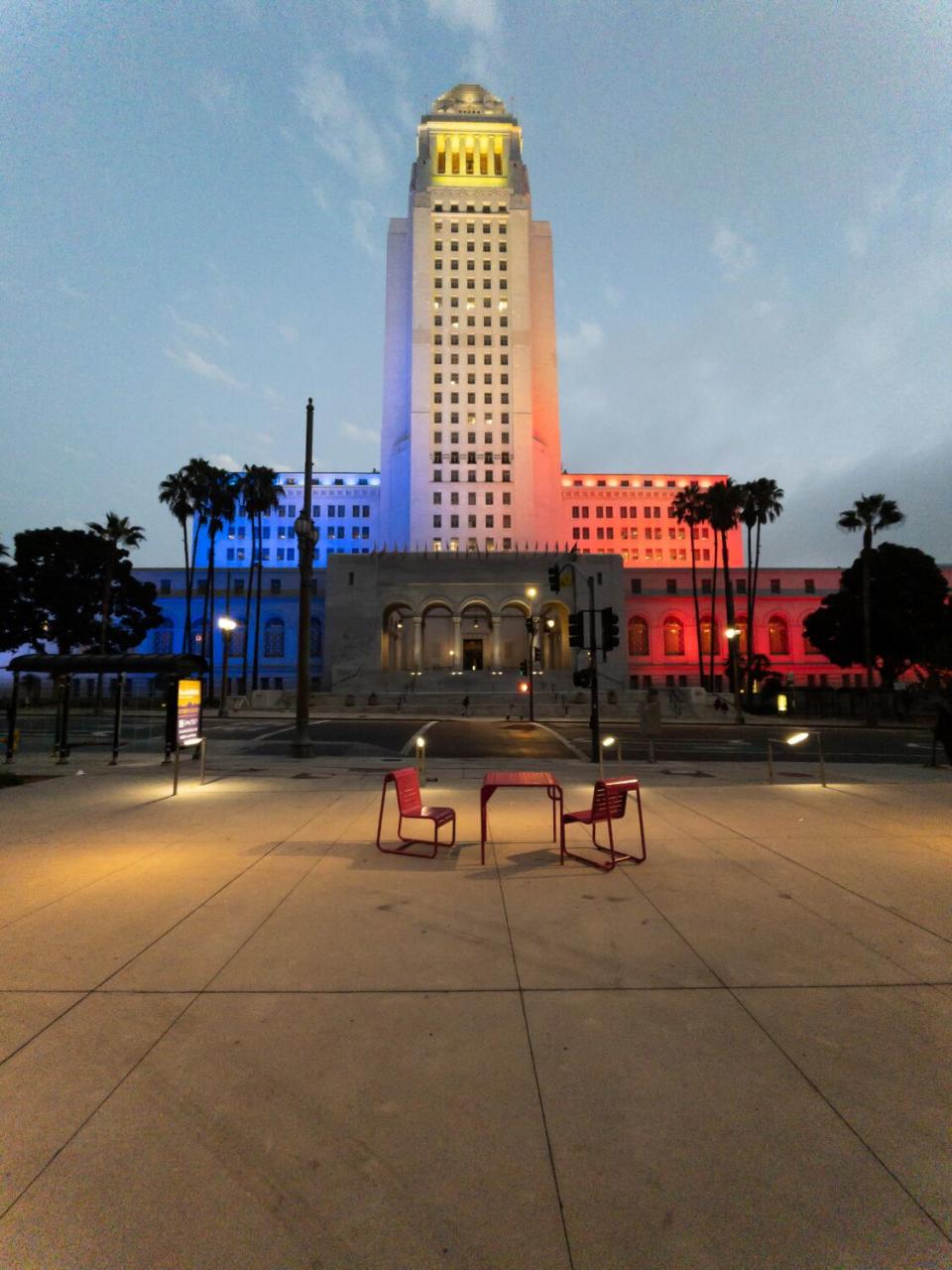
Whether he truly wants to be involved or not, I doubt many changemakers in the city outside of politics want to deal with De León right now. Black leaders in the city pushed for his immediate resignation, but their response to the tape leaking indicated that he is hardly their main priority. More than 60 of them signed a letter days after the leak demanding a “full investigation as to how the unethical, and perhaps illegal, consorting of elected officials around weakening majority-Black Council Districts may have negatively impacted Black community.” As Smiley said during the interview with De León, “Y’all were plotting against us!” Whether or not you agree with that assessment or want to apply more nuance to it, the fact is that is how a ton of Black folks in this city feel. A popular anger that should be ringing in the ears of all in city government, much like a song they can’t get out of their heads.
Black activists and community leaders will keep pressing forward, with or without De León. “It's really important that we lift up, we listen to those voices, which are going toe to toe with members of their own community, talking about the importance of Black political power,” said Lytle Hernandez. “And they're totally ready for this conversation.”
Indeed they are. “What happened really gives us something to build on that we should take this moment to redouble our efforts towards authentic solidarity and a collective vision, a shared vision of what we want from our city and from our world,” Abdullah told me.
If he actually wanted to affirm Black political power, as he claimed during the KBLA interview with Smiley, why not quit? How could he personally do anything more important to show that Black activists and community leaders have the kind of influence he says he wants them to have? They hardly require de León’s validation, of course. But if he truly wants to help, there is no better place to start.
For all De León's proclamations starting with the word “I,” here is my suggestion for another: “I did something racist. The best way to show that this behavior is unacceptable is to resign.” No one cares what's in your heart or deep inside your bones, councilman. We only care about what you did, and what you’ll do now.
This story originally appeared in Los Angeles Times.

